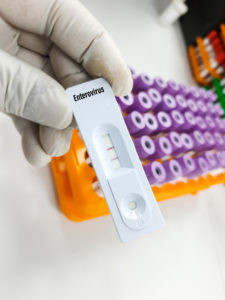
Pediatricians and top health officials are warning about an uptick in activity of a common virus that, in rare cases, can cause a polio-like syndrome in young children.
Recently, the Centers for Disease Control and Prevention (CDC) issued a health alert to providers about the enterovirus known as EV-D68.
While this bug is common and typically only causes colds, occasionally, children infected with it will develop limb weakness and a progressive form of paralysis called acute flaccid myelitis, or AFM. Other symptoms include drooping eyelids and trouble swallowing or speaking. Pediatric infectious disease physicians are urging pediatricians and clinicians at emergency departments and urgent care centers, as well as parents, to be on the lookout for early signs of AFM.
The CDC issued the following recommendations for healthcare providers:
- Consider EV-D68 as a possible cause of acute, severe respiratory illness (with or without fever) in children. Adults may also become infected with EV-D68, but it is thought to be more commonly detected in adults with underlying conditions.
- Consider laboratory testing of respiratory specimens for RVs and EVs (typically part of multiplex respiratory assays) when the cause of respiratory infection in severely ill patients is unclear, if not already part of typical diagnostic routine.
- Provide supportive clinical management for RV or EV, including EV-D68. There are no available vaccines or approved antiviral treatments.
- Report clusters of severe respiratory illness to local and state health departments.
- Strongly consider AFM in patients with acute flaccid limb weakness, especially after respiratory illness or fever, and between the months of August and November 2022.
- Collect specimens from multiple sources (cerebrospinal fluid [CSF], serum, stool, and a nasopharyngeal [NP] or oropharyngeal [OP] swab) from patients presenting with possible AFM as early as possible and preferably on the day of onset of limb weakness.
- Coordinate with your state public health laboratory to send AFM specimens to CDC for AFM and polio testing.
- Maintain vigilance and report possible cases of AFM to the state or local health department using the patient summary form.
Read full article here.
